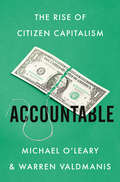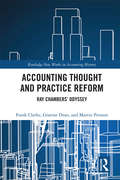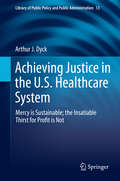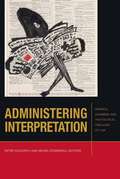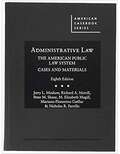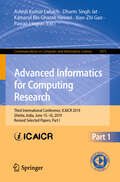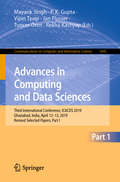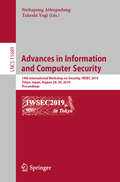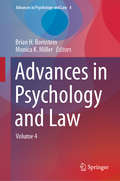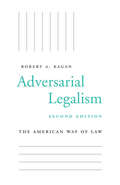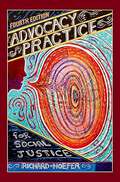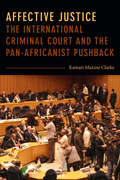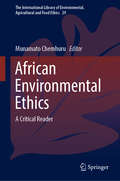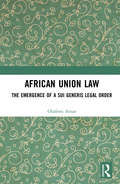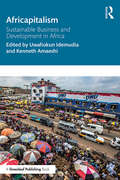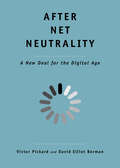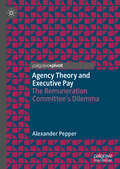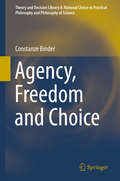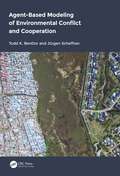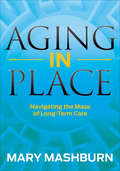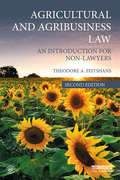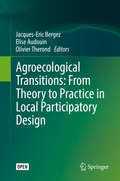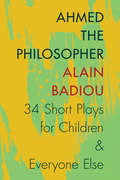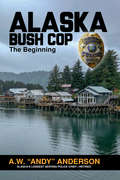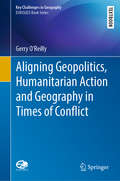- Table View
- List View
Accountable: The Rise of Citizen Capitalism
by Michael O'Leary Warren Valdmanis“More than ever before, this is the book our economy needs.” – Dr. Rajiv Shah, president of the Rockefeller Foundation“Unwilling to settle for easy answers or superficial changes, O’Leary and Valdmanis push us all to ask more of our economic system.” – Senator Michael F. BennetThis provocative book takes us inside the fight to save capitalism from itself.Corporations are broken, reflecting no purpose deeper than profit. But the tools we are relying on to fix them—corporate social responsibility, divestment, impact investing, and government control—risk making our problems worse.With lively storytelling and careful analysis, O’Leary and Valdmanis cut through the tired dogma of current economic thinking to reveal a hopeful truth: If we can make our corporations accountable to a deeper purpose, we can make capitalism both prosperous and good.What happens when the sustainability-driven CEO of Unilever takes on the efficiency-obsessed Warren Buffett? Does Kellogg’s—a company founded to serve a healthy breakfast—have a sacred duty to sell sugary cereal if that’s what maximizes profit? For decades, government has tried to curb CEO pay but failed. Why? Can Harvard students force the university to divest from oil and gas? Does it even matter if they do?O’Leary and Valdmanis, two iconoclastic investors, take us on a fast-paced insider’s journey that will change the way we look at corporations. Likely to spark controversy among cynics and dreamers alike, this book is essential reading for anyone with a stake in reforming capitalism—which means all of us.
Accounting Thought and Practice Reform: Ray Chambers’ Odyssey (Routledge New Works in Accounting History)
by Frank Clarke Graeme William Dean Martin E PerssonRaymond John Chambers was born just over a century ago on 16 November 1917. It is more than fifty years since his first classic, Accounting, Evaluation and Economic Behavior, was published, more than forty since Securities and Obscurities: Reform of the Law of Company Accounts (republished in 1980 as Accounting in Disarray) and over twenty since the unique An Accounting Thesaurus: Five Hundred Years of Accounting. They are drawn upon extensively in this biography of Chambers’ intellectual contributions, as are other of his published works. Importantly, we also analyze archival correspondence not previously examined. While Chambers provided several bibliographical summaries of his work, without the benefits of reviewing and interspersing the text with correspondence materials from the Chambers Archive this study would lack an appreciation of the impact of his early childhood, and nuances related to his practical (including numerous consultancies) and academic experiences. The ‘semi-biographical narrative’ codifies article and editorial length exercises by the authors drawing on parts of the archive related to theory development, measurement and communication. Other parts are also examined. This allows us to respond to those critics who claim his reforms were naive. They further reveal a man of theory and practice, whose theoretical ideas were solidly grounded on observations from his myriad interests and experiences. Many of his practical experiences have not been examined previously. This approach and the first book-length biography differentiates this work from earlier analyses of Chambers’ contribution to the accounting literature. We provide evidence to support the continued push for the reforms he proposed to accepted accounting thought and practice to ensure accounting is the serviceable technology so admired by Pacioli, Da Vinci and many other Renaissance pioneers. It will be of interest to researchers, educators, practitioners and regulators alike.
Achieving Justice in the U.S. Healthcare System: Mercy is Sustainable; the Insatiable Thirst for Profit is Not (Library of Public Policy and Public Administration #13)
by Arthur J. DyckThis book focuses on justice and its demands in the way of providing people with medical care. Building on recent insights on the nature of moral perceptions and motivations from the neurosciences, it makes a case for the traditional medical ethic and examines its financial feasibility. The book starts out by giving an account of the concept of justice and tracing it back to the practices and tenets of Hippocrates and his followers, while taking into account findings from the neurosciences. Next, it considers whether the claim that it is just to limit medical care for everyone to some basic minimum is justifiable. The book then addresses finances and expenditures of the US health care system and shows that the growth of expenditures and the percentage of the gross national product spent on health care make for an unsustainable trajectory. In light of the question what should be changed, the book suggests that overdiagnosis and medicalizing normal behavior lead to harmful, costly and unnecessary interventions and are the result of unethical behavior on the part of the pharmaceutical industry and extensive ethical failures of the FDA. The book ends with suggestions about what can be done to put the U.S. health care system on the path to sustainability, better medical care, and compliance with the demands of justice.
Administering Interpretation: Derrida, Agamben, and the Political Theology of Law (Just Ideas)
by Peter Goodrich and Michel RosenfeldPopulism in politics and policy orientations in law have thrown the jurisdiction of the academy and the disciplines of interpretation into disarray. Critique flounders in abstraction and negativity, law loses itself in particularity. Administering Interpretation brings together philosophers, humanists, and jurists from both continental and Anglophone jurisdictions to reassess the status and trajectory of interpretative theory as applied in the art of law. Tracking the thread of philosophical influences upon the community of legal interpretation, the essays move from the translation and wake of Derrida to the work of Agamben, from deconstruction to oikononmia. Sharing roots in the philological excavation of the political theology of modern law, contributors assess the failure of secularism and the continuing theological borrowings of juridical interpretation. The book brings contemporary critique to bear upon the interpretative apparatuses of exclusion, the law of spectacular sovereignty, and the bodies that lie in its wake.Contributors: Giovanna Borradori, Marinos Diamantides, Allen Feldman, Stanley Fish, Pierre Legrand, Bernadette Meyler, Michel Rosenfeld, Bernhard Schlink, Jeanne Schroeder, Laurent de Sutter, Katrin Trüstedt, Marco Wan
Administrative Law, The American Public Law System, Cases And Materials (American Casebook Series)
by Mariano-Florentino Cuéllar M. Magill Nicholas Parrillo Jerry Mashaw Richard Merrill Peter ShaneAdministrative Law, The American Public Law System, Cases and Materials (American Casebook Series) 8th Edition
Advanced Informatics for Computing Research: Third International Conference, ICAICR 2019, Shimla, India, June 15–16, 2019, Revised Selected Papers, Part I (Communications in Computer and Information Science #1075)
by Pawan Lingras Xiao-Zhi Gao Ashish Kumar Luhach Dharm Singh Jat Kamarul Bin Ghazali HawariThis two-volume set (CCIS 1075 and CCIS 1076) constitutes the refereed proceedings of the Third International Conference on Advanced Informatics for Computing Research, ICAICR 2019, held in Shimla, India, in June 2019. The 78 revised full papers presented were carefully reviewed and selected from 382 submissions. The papers are organized in topical sections on computing methodologies; hardware; information systems; networks; software and its engineering.
Advances in Computing and Data Sciences: Third International Conference, ICACDS 2019, Ghaziabad, India, April 12–13, 2019, Revised Selected Papers, Part I (Communications in Computer and Information Science #1045)
by Tuncer Ören Jan Flusser Mayank Singh P. K. Gupta Vipin Tyagi Rekha KashyapThis two-volume set (CCIS 1045 and CCIS 1046) constitutes the refereed proceedings of the Third International Conference on Advances in Computing and Data Sciences, ICACDS 2019, held in Ghaziabad, India, in April 2019.The 112 full papers were carefully reviewed and selected from 621 submissions. The papers are centered around topics like advanced computing, data sciences, distributed systems organizing principles, development frameworks and environments, software verification and validation, computational complexity and cryptography, machine learning theory, database theory, probabilistic representations.
Advances in Information and Computer Security: 14th International Workshop on Security, IWSEC 2019, Tokyo, Japan, August 28–30, 2019, Proceedings (Lecture Notes in Computer Science #11689)
by Nuttapong Attrapadung Takeshi YagiThis book constitutes the refereed proceedings of the 14th International Workshop on Security, IWSEC 2019, held in Tokyo, Japan, in August 2019. The 18 regular papers and 5 short papers presented in this volume were carefully reviewed and selected from 61 submissions. They were organized in topical sections named: Public-Key Primitives; Cryptanalysis on Public-Key Primitives; Cryptographic Protocols; Symmetric-Key Primitives; Malware Detection and Classification; Intrusion Detection and Prevention; Web and Usable Security; Cryptanalysis on Symmetric-Key Primitives; and Forensics.
Advances in Psychology and Law: Volume 4
by Brian H. Bornstein Monica K. MillerThe present volume consists of up-to-date review articles on topics relevant to psychology and law, and will be of current interest to the field. Notably, the majority of these topics are currently attracting a great deal of research and public policy attention in the U.S. and elsewhere, as evidenced by programs at the American Psychology-Law Society and related conferences. Topics for the present volume include: attitudes toward the police (Cole et al.), alibis (Charman et al.), hate crimes based on gender and sexual orientation (Plumm & Leighton), the role of gender at trial (Livingston et al.), neuroimages in court (Glen), intimate partner violence (Mauer & Reppucci), post-identification feedback (Douglass & Smalarz) and individual differences in eyewitness identification (Snowden & Bornstein), veterans’ wellbeing (Berthelot & Prager), and plea bargaining (Levett).
Adversarial Legalism: The American Way of Law, Second Edition (California Series In Law, Politics, And Society Ser. #1)
by Robert A. KaganAmerican dispute resolution is more adversarial, compared with systems of other economically advanced countries. Americans more often rely on legal threats and lawsuits. American laws are generally more complicated and prescriptive, adjudication more costly, penalties more severe. Here, Kagan examines the origins and consequences of this system.
Advocacy Practice for Social Justice
by Richard HoeferSince the publication of its first edition in 2005, Advocacy Practice for Social Justice has served as a clear, comprehensive, and practical resource for social work courses in advocacy, community practice, and macro practice. Now in its fourth edition, this text provides extensive information on the value base for advocacy; an examination of why people get involved in advocacy; and step-by-step instructions for social workers and others who want to impact laws, regulations, and policies at any level. Bearing in mind the National Association of Social Workers' Code of Ethics' requirements to advocate on behalf of vulnerable populations, readers learn that advocacy is a problem-solving technique similar to that used in social work practice of all types. The book moves through the stages of advocacy: getting involved; understanding the issue; planning; advocating through education, persuasion, and negotiation; presenting information effectively; monitoring and evaluating results; and integrating advocacy into a social worker's everyday practice. The fourth edition's inclusion of new topics and solid foundation in social work values make it a must-read as social work students and practitioners work diligently to maintain the profession's focus on successful advocacy for social justice.
Affective Justice: The International Criminal Court and the Pan-Africanist Pushback
by Kamari Maxine ClarkeSince its inception in 2001, the International Criminal Court (ICC) has been met with resistance by various African states and their leaders, who see the court as a new iteration of colonial violence and control. In Affective Justice Kamari Maxine Clarke explores the African Union's pushback against the ICC in order to theorize affect's role in shaping forms of justice in the contemporary period. Drawing on fieldwork in The Hague, the African Union in Addis Ababa, sites of postelection violence in Kenya, and Boko Haram's circuits in Northern Nigeria, Clarke formulates the concept of affective justice—an emotional response to competing interpretations of justice—to trace how affect becomes manifest in judicial practices. By detailing the effects of the ICC&’s all-African indictments, she outlines how affective responses to these call into question the "objectivity" of the ICC&’s mission to protect those victimized by violence and prosecute perpetrators of those crimes. In analyzing the effects of such cases, Clarke provides a fuller theorization of how people articulate what justice is and the mechanisms through which they do so.
African Environmental Ethics: A Critical Reader (The International Library of Environmental, Agricultural and Food Ethics #29)
by Munamato ChemhuruThis book focuses on under-explored and often neglected issues in contemporary African environmental philosophy and ethics. Critical issues such as the moral status of nature, African conceptions of animal moral status and rights, African conceptions of environmental justice, African relational Environmentalism, ubuntu, African theocentric and teleological environmentalism are addressed in this book. It is unique in so far as it goes beyond the generalized focus on African metaphysics and African ethics by exploring how these views might be understood differently in order to conceptualize African environmental ethics. Against the background where environmental problems such as pollution, climate change, extinction of flora and fauna, and global warming are plain to see, it becomes useful to examine how African conceptions of environmental ethics could be understood in order to confront some of these problems facing the whole world. This book will be of value to undergraduate students, graduate students and academics working in the area of African Philosophy, African Environmental Ethics and Global Ethics in general.
African Union Law: The Emergence of a Sui Generis Legal Order
by Olufemi AmaoThis book explores the emergence of African Union (AU) law as a legal order and its implications for existing order in the region. As an authoritative text on the development of AU law, the book covers such pertinent issues as legislative powers, competences, direct effect in AU law, subsidiarity, interventionism, and enforcement of laws. Olufemi Amao argues that there is a gradual movement from intergovernmentalism to supranationalism in the African Union legal order, and explores how this trajectory gradually and incrementally de-emphasises the discourse on nation state sovereignty; a concept that has caused many problems in the African context. Drawing upon EU law as a comparison, the book also examines how the development of supranationalism affects crucial issues such as human rights, democratic reforms, territorial matters, tribal and religious disputes, and economic relations. As a comprehensive examination of the development of law within a union, this book will be of great interest and use to students, scholars and practitioners in international law, international relations, and African studies.
Africapitalism: Sustainable Business and Development in Africa
by Kenneth Amaeshi Uwafiokun IdemudiaUsing theory, empirical research, and case studies, this book explores the changing nature of business in Africa and how businesses can actively contribute to the development of Africa. It uses (and critically analyses) the concept of Africapitalism – a management philosophy and movement which seeks to blend the best of African values and Western management theories as a basis for sustainable development in Africa – to understand the subtle factors that underpin business decisions in Africa. The collection of chapters in this book are organized around actors, issues, and reflections. They collectively present an account of Africapitalism, albeit from different perspectives and on different issues, and open up a new space for rethinking business and society relations in Africa from an Africapitalism perspective. Crucial is the critical engagement with both the discourse and practice of Africapitalism and its implications for sustainable development. It is anticipated that the challenges and opportunities highlighted by the book would be embraced by researchers, policy makers, and practitioners in the broad area of business and society in Africa. This multidisciplinary book will be valuable reading for advanced students, researchers and policymakers looking at business in society; corporate social responsibility; sustainable business; international business and African development.
After Net Neutrality: A New Deal for the Digital Age (The Future Series)
by Victor Pickard David Elliot BermanA provocative analysis of net neutrality and a call to democratize online communication This short book is both a primer that explains the history and politics of net neutrality and an argument for a more equitable framework for regulating access to the internet. Pickard and Berman argue that we should not see internet service as a commodity but as a public good necessary for sustaining democratic society in the twenty-first century. They aim to reframe the threat to net neutrality as more than a conflict between digital leviathans like Google and internet service providers like Comcast but as part of a much wider project to commercialize the public sphere and undermine the free speech essential for democracy. Readers will come away with a better understanding of the key concepts underpinning the net neutrality battle and rallying points for future action to democratize online communication.
Agency Theory and Executive Pay: The Remuneration Committee's Dilemma
by Alexander PepperThis new book examines the relationship between agency theory and executive pay. It argues that while Jensen and Meckling (1976) were right in their analysis of the agency problem in public corporations they were wrong about the proposed solutions. Drawing on ideas from economics, psychology, sociology and the philosophy of science, the author explains how standard agency theory has contributed to the problem of executive pay rather than solved it. The book explores why companies should be regarded as real entities not legal fictions, how executive pay in public corporations can be conceptualised as a collective action problem and how behavioral science can help in the design of optimal incentive arrangements. An insightful and revolutionary read for those researching corporate governance, HRM and organisation theory, this useful book offers potential solutions to some of the problems with executive pay and the standard model of agency.
Agency, Freedom and Choice (Theory and Decision Library A: #53)
by Constanze BinderIn this book, Binder shows that at the heart of the most prominent arguments in favour of value-neutral approaches to overall freedom lies the value freedom has for human agency and development. Far from leading to the adoption of a value-neutral approach, however, ascribing importance to freedom’s agency value requires one to adopt a refined value-based approach. Binder employs an axiomatic framework in order to develop such an approach. She shows that a focus on freedom’s agency value has far reaching consequences for existing results in the freedom ranking literature: it requires one to move beyond a person’s given all-things-considered preferences to the values underlying a person’s preference formation. Furthermore, it requires, as Binder argues, one to account (only) for those differences between choice options which really matter to people. Binder illustrates the implications of her analysis for the evaluation of public policy and human development with the capability approach: only if sufficient importance is ascribed to freedom’s agency value can the capability approach keep its promises.
Agent-Based Modeling of Environmental Conflict and Cooperation
by Jürgen Scheffran Todd BenDorConflict is a major facet of many environmental challenges of our time. However, growing conflict complexity makes it more difficult to identify win-win strategies for sustainable conflict resolution. Innovative methods are needed to help predict, understand, and resolve conflicts in cooperative ways.Agent-Based Modeling of Environmental Conflict and Cooperation examines computer modeling techniques as an important set of tools for assessing environmental and resource-based conflicts and, ultimately, for finding pathways to conflict resolution and cooperation. This book has two major goals. First, it argues that complexity science can be a unifying framework for professions engaged in conflict studies and resolution, including anthropology, law, management, peace studies, urban planning, and geography. Second, this book presents an innovative framework for approaching conflicts as complex adaptive systems by using many forms of environmental analysis, including system dynamics modeling, agent-based modeling, evolutionary game theory, viability theory, and network analysis. Known as VIABLE (Values and Investments from Agent-Based interaction and Learning in Environmental systems), this framework allows users to model advanced facets of conflicts—including institution building, coalition formation, adaptive learning, and the potential for future conflict—and conflict resolution based on the long-term viability of the actors’ strategies.Written for scholars, students, practitioners, and policy makers alike, this book offers readers an extensive introduction to environmental conflict research and resolution techniques. As the result of decades of research, the text presents a strong argument for conflict modeling and reviews the most popular and advanced techniques, including system dynamics modeling, agent-based modeling, and participatory modeling methods. This indispensable guide uses NetLogo, a widely used and free modeling software package, to implement the VIABLE modeling approach in three case study applications around the world. Readers are invited to explore, adapt, modify, and expand these models to conflicts they hope to better understand and resolve.
Aging in Place: Navigating the Maze of Long-Term Care
by Mary MashburnAn elder care expert offers essential information and advice on how to give your aging parent or loved one the best care possible in this stage of life. Caring for an aging parent or loved one can be overwhelming. From making sure their estate is in order and knowing their wishes are being honored, to more immediate concerns like where they will receive the best care after a hospital stay—there are many questions that are difficult to answer. In Aging in Place, certified senior advisor Mary Mashburn guides you through these and other common concerns so that you can address them with confidence and compassion. Using real life examples, Aging in Place promotes healthy family discourse on important elder care topics. Mary discusses the roadblocks and pitfalls you and your family might encounter, explains many useful planning techniques, and provides information on local and national resources. Whether in the midst of a crisis or just beginning to discuss options with loved ones, Aging in Place offers valuable insight and information on making choices that fit your unique situation.
Agricultural and Agribusiness Law: An Introduction for Non-Lawyers
by Theodore A. FeitshansThis introductory textbook provides an overview of the concepts necessary for an understanding of agricultural and agribusiness law. The text will help students of land-based industries with little or no legal background to appreciate and identify issues that may require referral or consultation with legal counsel. This new edition is fully revised and updated, particularly addressing developments in taxation and trade, and includes a new chapter on criminal law, an area of increasing relevance to agriculture. Each concise chapter addresses a different legal issue that those employed in agriculture and agribusiness may face, and both federal law and representative examples of state law are included. In addition to traditional topics such as contracts, property law, and estate planning, the book also covers more contemporary issues such as organic certification, animal law, genetically engineered crops, and food safety. Agricultural law extends beyond those directly engaged in farming to those in agribusiness who provide services and inputs to farmers, buy farmers’ products, store or transport products, manufacture food products and serve as intermediaries between farmers and consumers. The book will, therefore, also serve as a reference and a guide for those employed in agribusiness and agriculture.
Agroecological Transitions: From Theory To Practice In Local Participatory Design
by Jacques-Eric Bergez Elise Audouin Olivier TherondThis Open Access book presents feedback from the ‘Territorial Agroecological Transition in Action’- TATA-BOX research project, which was devoted to these specific issues. The multidisciplinary and multi-organisation research team steered a four-year action-research process in two territories of France. It also presents:i) the key dimensions to be considered when dealing with agroecological transition: diversity of agriculture models, management of uncertainties, polycentric governance, autonomies, and role of actors’ networks;ii) an operational and original participatory process and associated boundary tools to support local stakeholders in shifting from a shared diagnosis to a shared action plan for transition, and in so doing developing mutual understanding and involvement;iii) an analysis of the main effects of the methodology on research organisation and on stakeholders’ development and application;iv) critical analysis and foresights on the main outcomes of TATA-BOX, provided by external researchers.
Ahmed the Philosopher: Thirty-Four Short Plays for Children and Everyone Else
by Alain BadiouEnglish-speaking readers might be surprised to learn that Alain Badiou writes fiction and plays along with his philosophical works and that they are just as important to understanding his larger intellectual project. In Ahmed the Philosopher, Badiou's most entertaining and accessible play, translated into English here for the first time, readers are introduced to Badiou's philosophy through a theatrical tour de force that has met with much success in France. <P><P> Ahmed the Philosopher presents its comic hero, the "treacherous servant" Ahmed, as a seductively trenchant philosopher even as it casts philosophy itself as a comic performance. The comedy unfolds as a series of lessons, with each "short play" or sketch illuminating a different Badiousian concept. Yet Ahmed does more than illustrate philosophical abstractions; he embodies and vivifies the theatrical and performative aspects of philosophy, mobilizing a comic energy that exposes the emptiness and pomp of the world. Through his example, the audience is moved to a living engagement with philosophy, discovering in it the power to break through the limits of everyday life.
Alaska Bush Cop: The Beginning
by Andy AndersonI served as chief of police in the Alaska bush community of Seldovia for nearly 32 years. Alaska Bush Cop is the first of four books describing what actually took place during those years. When I took the chief's position, I had no training, and in this book, you'll find what I endured while learning how to be a police officer. I write about mistakes made and their repercussions. The events in Alaska Bush Cop did take place and are depicted the way they actually occurred. I think you will find it surprising when you read about many of the cases I write about. Many people feel a police officer in a small community has very little, or noting, to do. In reality, I kept busy in this one, and at times, two-man police department. I hope you find Alaska Bush Cop informative, enlightening, and entertaining.
Aligning Geopolitics, Humanitarian Action and Geography in Times of Conflict (Key Challenges in Geography)
by Gerry O'ReillyThis textbook offers valuable insights into the nexus between geography, geopolitics, and humanitarian action. It elucidates concepts regarding conflict and power, as well as the role of the state and the international community in mitigating and preventing violence and war. Here the material and non-material, existential or imagined reasons for conflict are deconstructed, ranging from land and resource grabs to Utopian ideals that can degenerate into dystopias, as with Daesh’s caliphate in Syria and Iraq. In turn, the issues discussed range from the local to wider national and global levels, as do their resolution mechanisms. Due to insecurities, the impacts of globalization, divisive nationalistic and isolationist reactions emerging in some democracies including the USA, the UK’s Brexit stress, and the ominous rise of populist parties across continental Europe (from France and the Netherlands to the Visegrád Group, the Balkans, and Greece), citizen fatigue has become increasingly evident, reflected in ever-growing socio-political malaise and violence.As the impact of any humanitarian disaster is proportional to the level of development of the area affected, concepts and categories of humanitarian action are explored, along with development issues at their core, especially in the Global South. Broadly speaking, humanitarian disasters fall into the categories of natural, human-made, technological, or complex; here, however, the focus is on human-made crises. Attempts at greater regulation, national and international organization and multilateralism to prevent violent conflicts, as well as enhanced responses to humanitarian emergencies, need to be supported now more than ever before.This textbook will appeal to graduate and upper undergraduate students and practitioners in the fields of geography, geopolitics, humanitarian action and geographies of conflict and war. In addition to the main content, it includes exercises, questions and sections for autonomous student learning.
